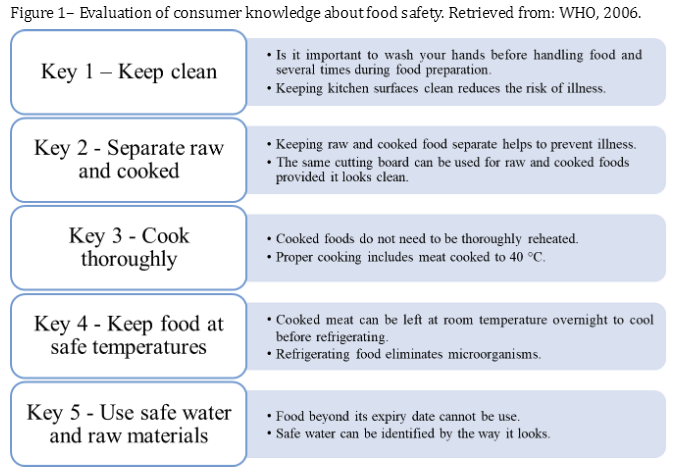Consumer knowledge about food safety and microbiological evaluation of beef sold in Brazil
DOI :
https://doi.org/10.21708/avb.2024.18.2.12325Résumé
Meat is highly perishable and is often associated with foodborne disease outbreaks. The risk associated with handling food at home is underestimated, as consumers generally associate foodborne disease outbreaks with food from food services. This study aimed to quantify Escherichia coli, coagulase-positive staphylococci, mesophilic aerobic bacteria, and Salmonella spp. in ground beef samples sold at commercial establishments in Pelotas, Rio Grande do Sul State, Brazil, and to evaluate the knowledge of food safety among consumers in the region. Microbiological analyses were performed on 70 ground beef samples, and the knowledge of 92 meat consumers was analyzed using an online questionnaire based on the World Health Organization (WHO) safe food guidelines. Fifty percent of the meat samples had aerobic mesophilic microorganism counts above the limit established by Brazilian legislation, indicating unacceptable food quality. Only two samples (2.86%) had counts of coagulase-positive staphylococci above those allowed by legislation. The consumer knowledge regarding food safety showed that items related to "cook thoroughly" and "keeping food at safe temperatures" had the lowest percentage of correct answers. Dissemination of information about temperatures that ensure food safety is essential for consumers, especially considering that even with high levels of contamination, most microorganisms are destroyed by heat.
Téléchargements

Téléchargements
Publié-e
Numéro
Rubrique
Licence
(c) Tous droits réservés Acta Veterinaria Brasilica 2024

Cette œuvre est sous licence Creative Commons Attribution 4.0 International.
Autores que publicam na Acta Veterinaria Brasilica concordam com os seguintes termos: a) Autores mantém os direitos autorais e concedem à revista o direito de primeira publicação, com o trabalho simultaneamente licenciado sob a Licença Creative Commons Attribution que permite o compartilhamento do trabalho com reconhecimento da autoria e publicação inicial nesta revista. b) Autores têm autorização para assumir contratos adicionais separadamente, para distribuição não-exclusiva da versão do trabalho publicada nesta revista (ex.: publicar em repositório institucional ou como capítulo de livro), com reconhecimento de autoria e publicação inicial nesta revista. c) Autores têm permissão e são estimulados a publicar e distribuir seu trabalho online (ex.: em repositórios institucionais ou na sua página pessoal) a qualquer ponto antes ou durante o processo editorial, já que isso pode gerar alterações produtivas, bem como aumentar o impacto e a citação do trabalho publicado (Veja O Efeito do Acesso Livre).


 Esta obra está licenciada com uma Licença
Esta obra está licenciada com uma Licença 